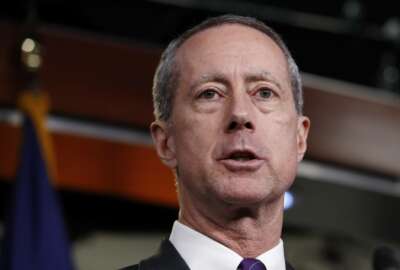
Fate of space force in House NDAA to be decided in open debate, stage set for clash over topline spending
A fiery debate is likely brewing over the future of a space force after the House Armed Services Committee decided not to address the White House’s request to...
A fiery debate is likely brewing over the future of a space force after the House Armed Services Committee decided not to address the White House’s request to create the new service in its annual policy bill.
“There’s a very wide range of opinions from hell no to full space force and it covers both sides and stretches across the aisle,” a committee aide said. “We wanted to give members the opportunity to debate because they couldn’t come to an agreement with the chairman on what they wanted to do, so this gets bumped forward. It’s really a better opportunity for members to have more time and also for them all to have the opportunity to say something. Creating a new force is a big deal, and doing it in a chairman’s mark really isn’t an appropriate place to put it.”
The committee members will markup the 2020 defense authorization bill next Wednesday. It’s almost guaranteed an amendment will be offered concerning the space force during that markup, giving the committee ample opportunity for robust debate.
House Armed Services Ranking Member Mac Thornberry (R-Texas) put out a statement criticizing the lack of a space force in the bill.
The space force saga does not end there, however. The Senate Armed Services Committee’s version of the bill creates a space force within the Air Force. If the House does not adopt a provision concerning the force or if its provision differs at all from the Senate version, then the two houses will need to iron out the differences.
Funding
The House bill authorizes $733 billion for the Defense Department in 2020. That number is in line with the House appropriations defense bill. The authorization bill puts $633 billion in the base budget, $69 billion in the overseas contingency operations (OCO) account, — an emergency war spending kitty that is not beholden to the budget caps — and $22.7 billion for other defense related spending in the Energy Department and other agencies.
“This authorization level will allow our military to maintain readiness, expand capabilities and invest in the new software and technologies required to secure our country and protect us against our adversaries,” a statement from committee chairmen Adam Smith (D-Wash.) said. “The proposal meets the committee’s goal to facilitate a strong national defense apparatus that is resourced properly, accountable for its actions and cognizant of the essential, direct oversight role of Congress.”
The funding is below the president’s request of $750 billion. The Senate version of the 2020 authorization bill also authorizes $750 billion.
Both authorization bills and the House defense appropriations bill reject the White House’s scheme to put $98 billion in OCO to avoid going over the budget caps imposed by the 2011 Budget Control Act, which would trigger sequestration. If Congress wants that money in the base budget it will need to come to a deal to raise the budget caps.
Other provisions
Outside of the blockbuster topics of space force and funding, the House authorization bill prohibits using defense funds to build barriers along the southern border and limits DoD’s authority to reprogram funds.
DoD reprogrammed $1.5 billion in March from other defense projects to fund the border wall.
The bill also tackles some new acquisition issues.
The bill creates a new acquisition pathway for software so DoD can buy technology faster and keep systems secure.
The provision was originally suggested by the Defense Innovation Board.
The bill also focuses on supply chair rise management.
“The provision is calling for DoD to do an assessment in consultation with the Office of Management and Budget taking into account the federal acquisition supply council created last year, as well as an interagency committee that is currently in existence,” a committee aide said. “Once that assessment is done and reported there is then a directive to promulgate guidance. That guidance will be dependent on what that assessment shows.”
The bill does not fence off any funds from DoD for its slow pace in implementing previous acquisition reforms. Thornberry said he wanted to cap DoD’s funds in the bill until the department picked up its pace applying previous reforms from past authorization bills.
Finally, the mark sets aside $140 million for more civilian housing personnel for on-base privatized housing. The military is in the middle of a scandal where military families are exposed to mold, mice and lead paint in their homes.
The House plans to bring the bill to the floor after the July 4 recess.
Copyright © 2024 Federal News Network. All rights reserved. This website is not intended for users located within the European Economic Area.
Scott Maucione is a defense reporter for Federal News Network and reports on human capital, workforce and the Defense Department at-large.
Follow @smaucioneWFED





